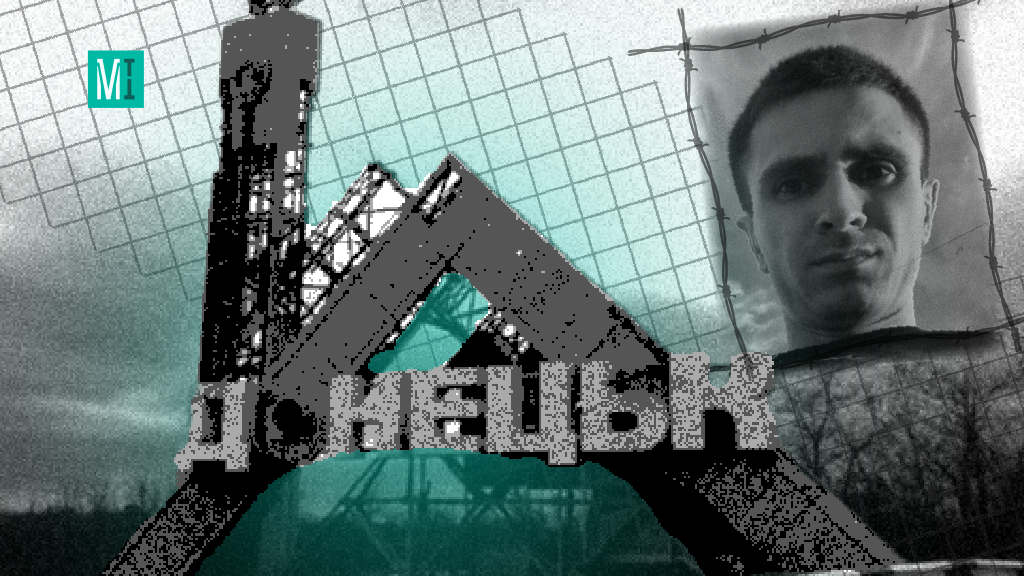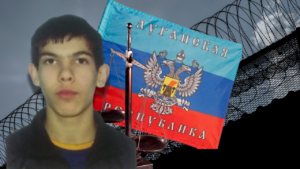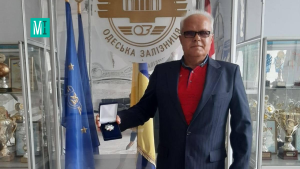Geneva Conventions violations by the Russian Federation prior to February 24: detention of Viacheslav Shabolda, a Donetsk resident

Before February 24, civilians were also detained in Donetsk, accused of sabotage and espionage for the benefit Ukraine. Some have been held in pretrial detention facilities for more than three years without a so-called trial, including Viacheslav Shabolda. He was kidnapped from his workplace in Donetsk on June 24, 2019, by officers of the so-called Ministry of State Security of the terrorist organization “DPR.”
Initially, Shabolda‘s relatives were not advised of his arrest. It was only later that his wife learned about Viacheslav’s so-called “administrative arrest” for up to 30 days with no charges made known. According to Shabolda’s wife Iryna Momot, they started torturing her husband during the first month and threatening his children with violence. At that time, Viacheslav and his wife were raising two young children—a two-year-old son and a three-month-old daughter. The man’s family has been on the territory controlled by Ukraine since his detention.
For the first four months, Viacheslav Shabolda was not allowed a lawyer, and his relatives were not informed of where he was in custody.
According to Momot, Viacheslav Shabolda has been held in Donetsk Pretrial Detention Facility since November 1, 2019. All this time, she has not been allowed to exchange mail with her husband and may pass on food and medicine once a month through a lawyer. When Iryna asked permission to add a photo of their children with words on the back “We love you! We are waiting for you,” the photo was returned with a mark “Mail is not allowed.”
Now she only communicates with the detainee through the lawyer. According to him, Viacheslav Shabolda complains that after the start of the full-scale invasion of Russia, detention conditions in Donetsk Pretrial Detention Facility have deteriorated greatly. The cell is overcrowded with 28 people, so the inmates are forced to sleep in turns.
The first court hearing in the “case” of Viacheslav[1] Shabolda was held on September 12, 2022. However, the lawyer failed to appear, and the hearing was adjourned. Trial of the “case” actually started as late as on September 21, when more than three years passing since his arrest. In general, as the prisoners point out, the pseudo-courts of the terrorist organization “DPR” have just begun to try the cases of civilians and military personnel detained in 2019.
During the first hearing, Viacheslav Shabolda was allowed to speak. He testified of tortures, extraction of confessions. However, the “judge” or the “prosecutor’s office” did not respond to his testimony.
After Russia simulated “pseudo-referendums” on September 23-27 in the occupied Ukrainian territories to include in the Russian Federation, the so-called local “judges” took a break and went to the Russian Federation for accreditation for a month.
Iryna hopes that Viacheslav will be released from prison soon. Several civilians detained on the same charges as her husband (“espionage”, Article 321 of the occupation criminal code) were released by the aggressors during a PoW exchange.
“In general, this case demonstrates serious violations of the laws and customs of war. It is evidence of a war crime. Geneva Convention I of 1949 lays down fundamental rules of treatment of the civilian population during wartime. According to the standards of international humanitarian law, unlawful deprivation of liberty of civilians is prohibited,” — says Andrii Yakovlev, a lawyer at Umbrella JSC and an analyst at MIHR.
He emphasizes that the laws and customs of war require the release of detainees as soon as the rationale behind their arrest no longer holds (see Part 3, Article 2 of the Additional Protocol (Protocol I) to the Geneva Conventions).
“Whenever the occupying party detains and charge a civilian with a criminal offense, as was the case with Viacheslav Shabolda, the detainee should be entitled to challenge the arrest in a court and to have the grounds of detention scrutinized. That is, a civilian must have basic guarantees of a fair trial that adheres to the generally recognized principles of legal process, the deprivation of which is a gross violation of international humanitarian law,” — adds Yakovlev.
Therefore, the occupation administration of Donetsk created by the Russian Federation deprived Viacheslav Shabolda of his liberty and the right to a fair trial unlawfully, in violation of international humanitarian law, which is a serious (gross) violation of the Geneva Conventions of August 12, 1949, and constitutes a war crime.
—
The project “The quasi legal system in the occupied Donbas: combating impunity by legal and advocacy tools” is implemented by the Media Initiative for Human Rights with the financial support of the Embassy of the Kingdom of the Netherlands in Kyiv.







